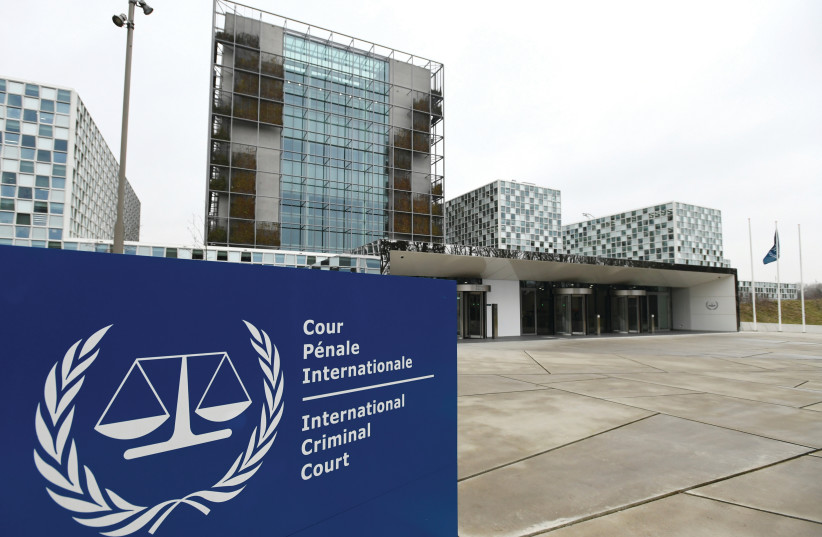Arguments about judicial reform, ICC are legally baseless – opinion
Members of Israel’s security service who threaten to refuse to serve in response to the passage of any judicial reform argue that such measures will expose them to prosecution by the International Criminal Court in The Hague.
The often-heard claim is that the Supreme Court is a legal “Iron Dome” against hostile international lawfare. Deputy Attorney General for International Law Dr. Gil-Ad Noam argued before the Knesset that restricting the “reasonableness doctrine” will make it harder for Israel to push back against international criminal investigations.
The arguments about judicial reform and the ICC are legally baseless and worse, confer on the biased and weak body in The Hague a legitimacy it does not deserve.
ICC has no authority to investigate Israel
Israeli governments both Left and Right have maintained the consistent position that the ICC has no authority to investigate Israel. Israel never ratified the Rome Convention, which created the tribunal, and like the United States, has never accepted the ICC’s jurisdiction. Under such circumstances, the only way The Hague could exercise jurisdiction over the state of Israel would be if crimes were committed in an ICC member’s territory.
 INTERNATIONAL CRIMINAL Court, The Hague. (credit: PIROSCHKA VAN DE WOUW/REUTERS)
INTERNATIONAL CRIMINAL Court, The Hague. (credit: PIROSCHKA VAN DE WOUW/REUTERS)Binding Israeli-Palestinian agreements leave the territorial boundaries of any future Palestinian state to a final resolution. A Palestinian state does not exist. Even if such a state did exist along the lines of the Oslo Accords, it would have no de jure or de facto jurisdiction over Area C of Judea and Samaria, Jerusalem or Israeli nationals.
Yet in spite of all of this, the ICC declared in 2021 that “Palestine” was a country, and that it had joined the Rome Statute, allowing the tribunal to investigate Israeli actions in Gaza and the West Bank. In no other case has the ICC recognized a “state” without UN membership. In an unprecedented move, leading ICC member states such as the UK and Germany, formally endorsed Israel’s position that the court has no authority.
Hostility to Israel is inherent to the ICC’s basic structure. The Rome Convention, at the behest of the Arab states, made one departure from the traditional definition of war crimes listed in the Geneva Convention. This carve-out specifically targets Israel, tailoring a new definition of transfer and settlement of citizens into disputed territories which is designed to retroactively criminalize and selectively target in Judea and Samaria.
This is underscored by the Court’s refusal to investigate the massive transfer of Turkish nationals to Northern Cyprus or Russian nationals into Ukrainian-occupied territory, despite both Cyprus and Ukraine being actual countries that have accepted The Hague’s jurisdiction.
Where the ICC does have jurisdiction, it only prosecutes if the home state is “unable or unwilling” to investigate or prosecute a crime. This is known as the complementarity principle, and the argument is that reforming the reasonableness doctrine will make it impossible for the ICC to conclude Israel has made an independent investigation of alleged crimes. This is absurd.
The ICC is an international body, the member states of which cover a wide range of legal and political systems, including even monarchies. Nothing in its jurisprudence suggests complementarity requires any particular configuration of balance of powers or relates at all to the fine details of domestic law, such as the Supreme Court’s ability to disagree with discretionary ministerial appointments or decisions.
Indeed, it has found the legal system of Guiana – noted for its broad corruption and lack of judicial independence – adequate to satisfy “complementarity.”
Furthermore, if the anti-reform claims were true, the ICC would have held back from beginning an investigation into the “situation in Palestine” in 2021, when the Israeli Supreme Court was at the peak of its powers. The reform of the reasonableness clause does not involve Israel’s criminal justice system, its independence, or the ability of prosecutors to prosecute offenses committed by its soldiers.
Soldiers who act outside the law are tried by the military courts and not by the Supreme Court so the judicial reform has no bearing on complementarity. Even setting all that aside, prosecutions of the ICC tend to target political and military leaders, not ordinary soldiers. Pilots’ identities are in any case kept anonymous, making ICC charges against them exceedingly unlikely in any case.
All this is a red herring since the centerpiece of the ICC’s investigation into Israel is the alleged “crime” of Jewish presence in Judea and Samaria. The Supreme Court has never treated Jewish settlement as a criminal issue; prosecutors have not investigated the government for allowing Jews to live in these places because they do not regard it as inherently criminal. Regarding this charge, the Israeli justice system will never satisfy the ICC’s requirements for complementarity.
Those who drafted the petition to refuse military service pretend the ICC is interested in judicial issues and produces unbiased decisions. In fact, The Hague continues its investigations with no legal basis simply because hostility to Israel is baked into its founding convention, even if no judicial reform was passed.
Unlike judicial reform, opposition to the ICC is not a political issue in Israel. Benny Gantz has denounced The Hague as “blind and unjust.” Using it as a bogeyman in domestic political disputes undermines Israel’s categorical rejection of that tribunal’s authority.
Reform critics are enlisting in their cause an illegitimate and undemocratic international tribunal as an argument against democratic Knesset legislation. Whatever one thinks of judicial reform, this tactic invites international intervention rather than deterring it.
Prof. Eugene Kontorovich is the director of the Center for the Middle East and International Law at George Mason University Scalia Law School and a scholar at the Kohelet Policy Forum, where Avraham Russell Shalev is a researcher.





Comments are closed.